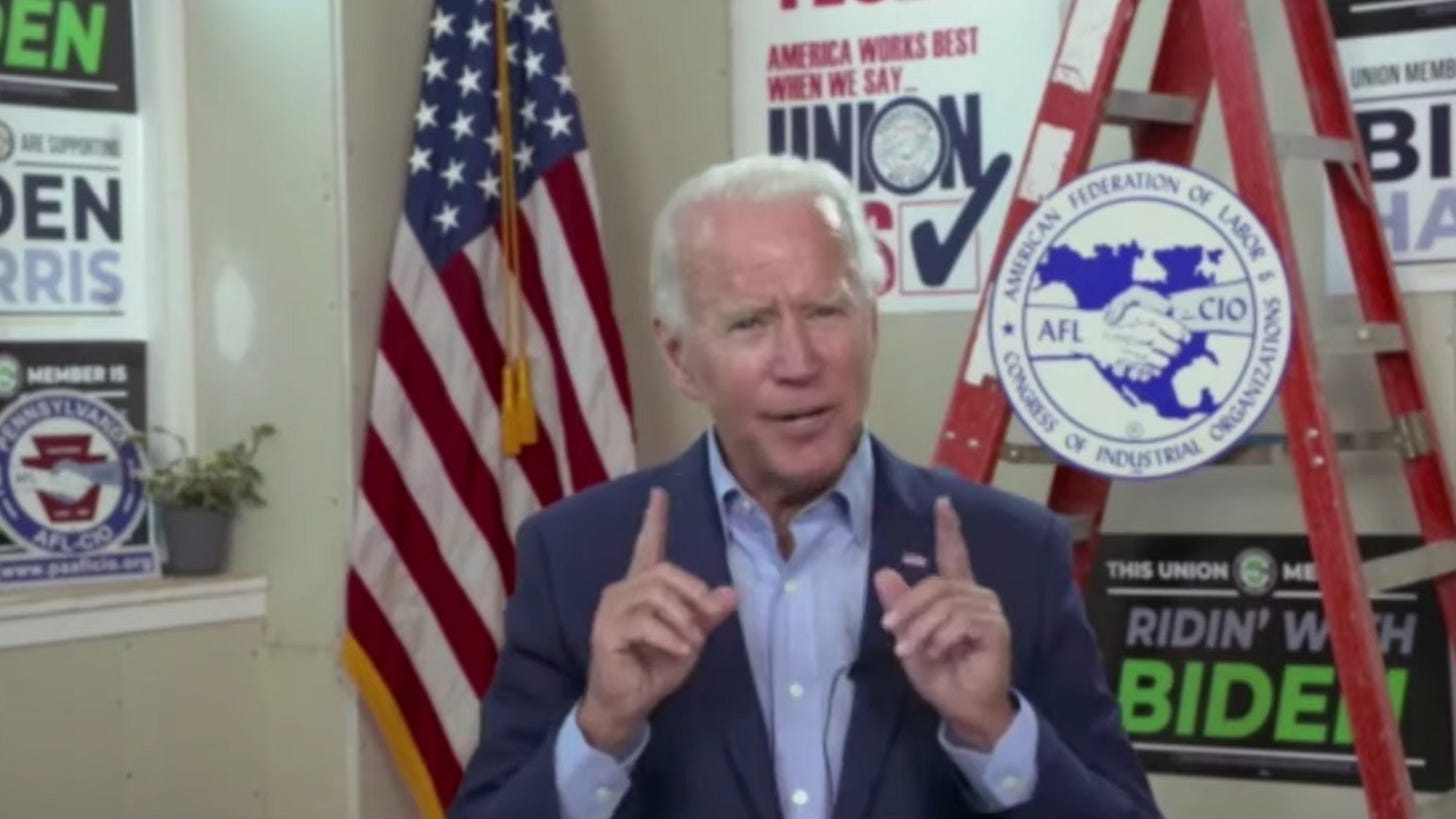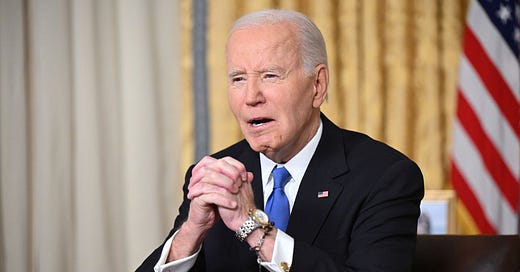
Why Won't Joe Biden Touch the Biggest Union Drive in America?
Backing the Amazon union should be an easy call. Biden won't do it.
Joe Biden grew up in Scranton, Pennsylvania, a blue-collar town filled with blue-collar people. In his presidential campaign, he garnered the support of dozens of international, national, statewide and local unions. Joe Biden was the working mans' candidate, the narrative goes (despite the fact that actual vote tallies showed him gathering less working-class support than Obama in 2008 or Clinton in 2016).
Within the first days of his administration, Biden fired Peter Robb, the Trump-appointed general counsel to the National Labor Relations Board, and replaced him with Peter Sung Ohr, who immediately started undoing his predecessors' largely anti-union work. But for now, this is as far as the Biden administration seems to want to go on the issue of unions. Now, Biden has apparently decided to completely opt out of offering an opinion on one of the largest and most consequential union drives in the country, the RWDSU drive at the Amazon warehouse in Bessemer, AL.
There are generous and non-generous ways to read this, but when push comes to shove, the "strongest labor president you've ever had" is unwilling to throw his weight around in an industry-defining election.
The White House is very clear on this. In statements to various reporters and an email to Discourse Blog this afternoon, spokespeople have held firm to the line that the White House doesn't want to comment on a specific case that is before the NLRB. In one view of politics, that makes sense — the NLRB is supposed to be nonpartisan, and it could be seen as uncouth if the president were to use his bully pulpit to influence the results of an ongoing union election.
In another view of politics, of course, what the fuck else is the bully pulpit for? As Stuart Applebaum, president of the RWDSU, put it in an interview with HuffPost:
“I think it’s important for the administration to demonstrate during this campaign its support for unionization. This is the largest campaign in many years, and this is a great opportunity for the administration to show working people what’s important to them.”
Clearly, the head of the union trying to organize the Amazon workers wouldn't be pushing Biden to do anything that would jeopardize that effort, so there's not much of a reason for Biden to stay on the sidelines here. But that is what he seems intent on doing.
In an email to Discourse Blog, a White House spokesperson reiterated the boilerplate statement already given to Politico: “President Biden has urged employers not to run anti-union campaigns or interfere with organizing and bargaining, and has called for holding employers accountable and increasing penalties when they do."
Ok, sure. But let's consider the forces stacked up on either side of this. On one side you have Amazon, one of the largest companies in the world, which has been engaging in a massive, brutal, and all-encompassing anti-union campaign globally for years and specifically in Bessemer for many, many months. On the other side you have the RWDSU, labor leaders, and various activists, and, ostensibly, the federal government, whose job it is to ensure that workers can make a fair and informed decision as to whether or not they want a union. You could absolutely argue that it's not Biden's job to encourage workers to vote one way or another (despite all of his clearly stated and decades-long support on paper for organized labor). But it's a lot harder to argue that a boilerplate statement is a good enough use of executive power in the face of Amazon's avalanche of money and hostile propaganda.
Just today, Amazon somehow slipped anti-union ads onto the highly-popular Twitch streaming platform (which it owns), which were explicitly against the site's TOS regarding political advertising. Twitch's response was, generally "golly gee, we're sorry those got on there," and it took down the ads after community uproar. In other words, one side here is playing every angle it's got. The other side is once again pretending to operate in a world where everyone plays by the rules.
It's worth noting, as HuffPost does, that Biden's Democratic predecessor, Barack Obama, failed a similar test as well, when he stayed out of publicly endorsing the United Auto Workers' failed effort to unionize a Volkswagen plant in Tennessee in 2014. The White House's policy isn't new — but it is clearly insufficient if the Biden administration wants to accomplish its stated goals of being an ally to organized labor. There are many reasons why Biden would pull back from this, which you can speculate on if you want (Jay Carney, who served as press secretary for both Biden and Obama at one point, has been personally leading some of Amazon's worker-hostile campaigns in his new role as an SVP at the company), but the simplest answer is that the current administration is uninterested in exerting political power against companies directly, because of its adherence to outdated norms of impartiality once it takes office.
The GOP, of course, has no such qualms. From HuffPost:
Whatever concerns Biden might have about inserting himself in a union election has not stopped some prominent Republican politicians before him. During the UAW’s campaign at Volkswagen, former Sen. Bob Corker (R-Tenn.) assured more work at the plant if workers rejected the union. Then-Tennessee Gov. Bill Haslam also urged workers to turn down the union, saying it would force the company to abandon plans to expand.
Granted, various Democratic politicians who are not the president, like Senator Bernie Sanders and Rep. Ilhan Omar, have spoken out in favor of the Bessemer union, and others have spoken out against Amazon's hostile behavior toward the union. But there's no real reason they should be alone: thus far, the Biden White House has done neither. To hear them tell it, the concept of an anti-union drive is bad, but they're prohibited by policy from commenting when one is right in front of their faces. Democrats control the White House, Congress, and the Senate. What is the point of having that power if our leaders don't want to wield it?












